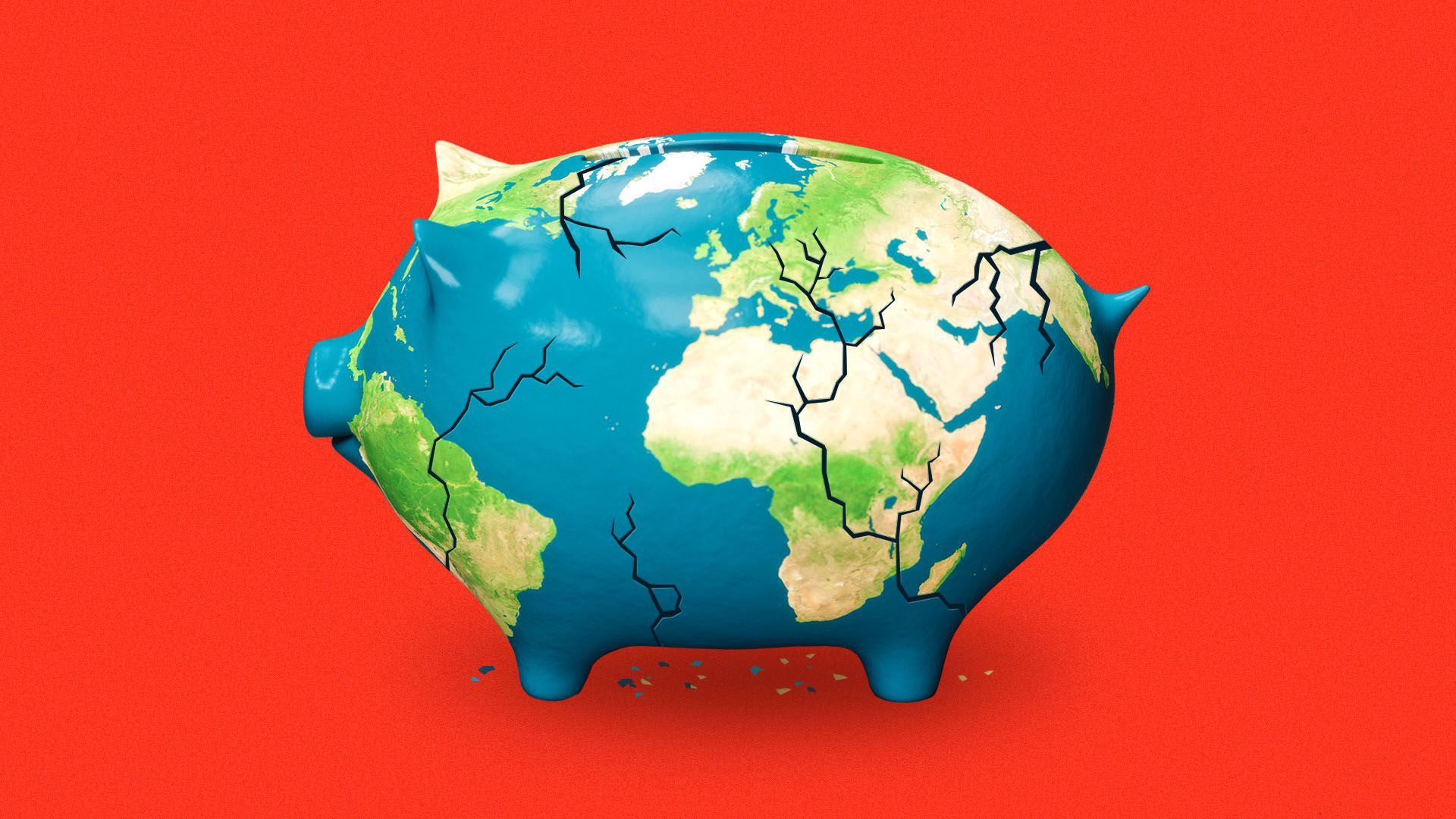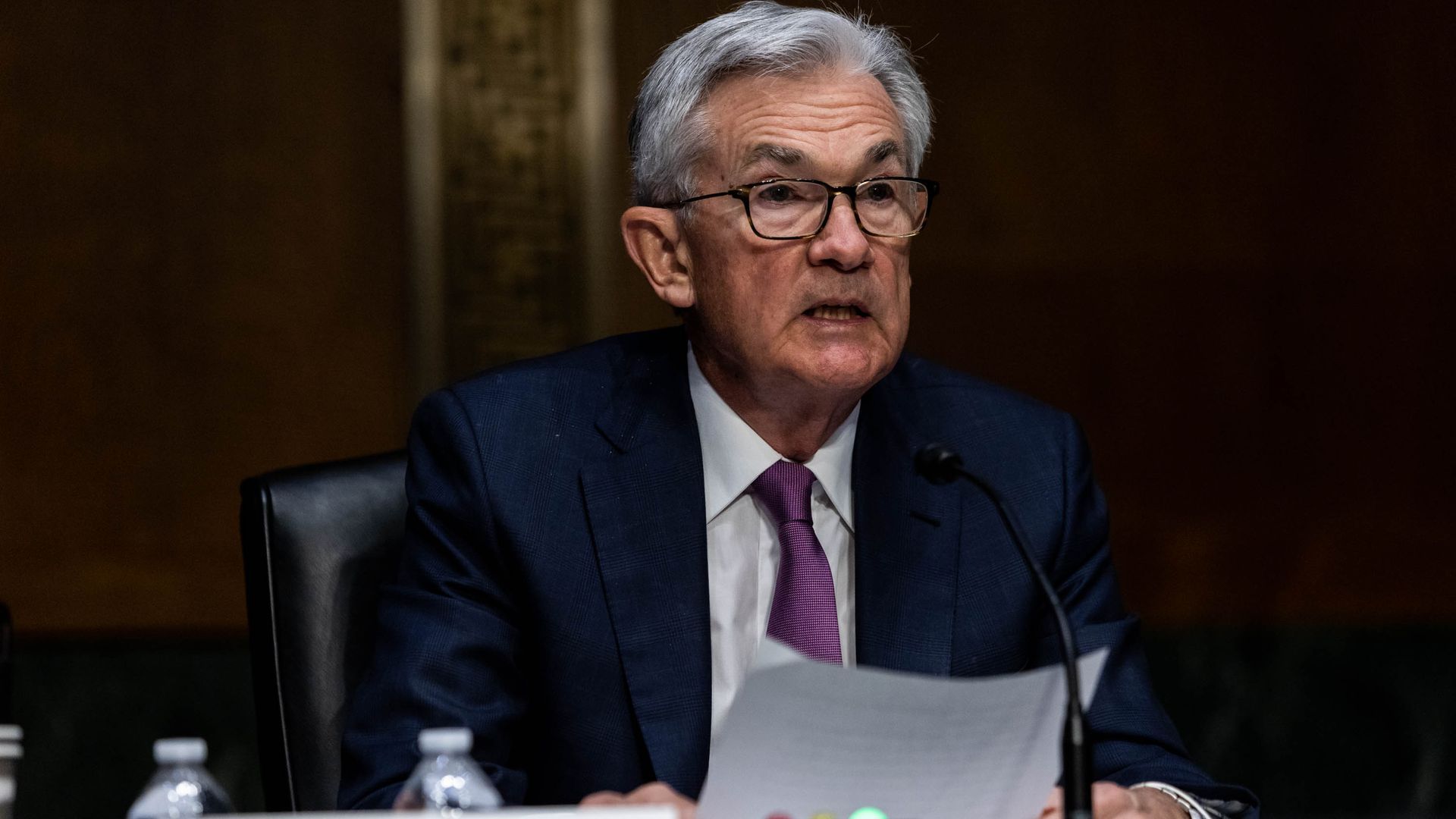January 12, 2022
👋 Good morning! Today’s newsletter is 1,206 words, 5 minutes.
👀 All eyes will be on the latest inflation numbers when they’re released this morning.
- Economists expect that as of December, the Consumer Price Index will show an increase of 7% over the course of the year.
1 big thing: Gap grows between rich, poor countries

Illustration: Sarah Grillo/Axios
For the last two decades, incomes in poorer countries were catching up to rich countries. The pandemic economy of the 2020s may reverse the trend, the World Bank warns in a new report, Axios' Neil Irwin writes.
Why it matters: Falling inequality between countries has been one of the most positive trends of the 21st century. If it reverses, it implies more human suffering and geopolitical instability.
The big picture: In its Global Economic Prospects report, the development organization lays out a constellation of factors that are making the economic impact of the pandemic more lasting and severe in countries that were poorer to begin with.
- They are less likely to have effective mechanisms to obtain and rapidly distribute vaccines.
- They tend to have more limited access to debt markets and therefore less capacity for large-scale government borrowing to cushion the economic pain.
- Inflation tends to be more of a problem. For rich countries, higher food prices are an annoyance; for poor countries, they can cause mass starvation.
What they're saying: "I'm very worried about a permanent scar on development," World Bank president David Malpass told reporters yesterday.
By the numbers: The bank projects overall global growth will slow from 5.5% in 2021 to 4.1% in 2022 and 3.2% in 2023.
- But whereas advanced economies are on track to return to their pre-pandemic economic trend, emerging market and developing economies are forecast to remain "markedly below" those levels.
Our thought bubble: Emerging economies face a paradox. Their citizens suffer from high inflation but they also stand to suffer from efforts by central banks to contain inflation by raising interest rates, which constrains credit worldwide.
- When the Fed raises interest rates to fight inflation, it tends to slow the economies of Asia, Latin America and beyond, where borrowing takes place in dollars.
The bottom line: The world faces a bumpy road in recovering from the pandemic recession, and it is bumpiest in the places with the fewest resources.
2. Catch up quick
An unusual coalition of progressive Democrats and MAGA Republicans is proposing a ban on sitting lawmakers’ ability to trade individual stocks. (Axios)
Amazon workers in Alabama will vote (again) next month on whether to form a union after a federal agency found that Amazon improperly interfered with last year’s failed unionization vote. (Washington Post)
Citigroup plans to sell its Mexico consumer banking business, Banamex, as part of a broader strategic exit from some of its global consumer banking markets. (WSJ)
3. Powell's next four years

Photo: Graeme Jennings-Pool/Getty Images
Jerome Powell got a glimpse yesterday at what his next four years will look like, Neil reports.
- Powell's Senate confirmation hearing for a second term as Federal Reserve chair went smoothly and his confirmation appears to be on track — but it showed how his upcoming term will feature the Fed in the political crosshairs.
Why it matters: The Fed tries to be above the fray of partisan politics, but in a polarized America, there may be no such thing.
The big picture: Opening statements from Senate Banking Committee chair Sherrod Brown (D-Ohio) and ranking member Pat Toomey (R-Pa.) showed the ways the Fed finds itself in the middle of fraught political disputes.
- Brown urged the Fed to aim for a hot labor market that generates gains for workers, to focus on diversity and racial equality, and to use its powers to try to contain the risks of climate change.
- Toomey argued the Fed should move aggressively to rein in inflation, and attacked Fed regional banks for engaging on racial justice and climate issues.
What they're saying: "Political fads come and go, but the dollar doesn’t," said Sen. John Kennedy (R-La.). "It underpins the entire world economy. Politicize it at your own risk."
But, but, but: What Kennedy and other Republicans see as politicizing the Fed, Democrats see as profound national priorities — achieving more racial equality and addressing climate change.
Between the lines: Powell is a savvy political operator who is skilled at building bridges across partisan lines — as reflected in his appointments by Presidents Obama, Trump and Biden.
- Toomey said he will vote to confirm Powell despite misgivings about the direction of the Fed, as have a handful of other Republican senators. That smoothes the path to confirmation even with "no" votes from the left flank of the Democratic caucus.
What's next: Lael Brainard, Biden's nominee for vice chair of the central bank, is likely to see more pointed attacks from Republicans in her confirmation hearing tomorrow on her role in pushing the Fed to regulate banks more aggressively and focus more expansively on climate risk.
The bottom line: The Fed will face new political pressures in the coming years, and, assuming he is confirmed, test Powell's skills of diplomacy.
4. One piece of the worker shortage

Unvaccinated workers, particularly low-wage earners, were much more likely to miss a full week of work because they had COVID symptoms or were caring for someone with symptoms — even before Omicron, according to a new analysis of December Census data, Axios' Emily Peck writes.
Why it matters: Worker absences are causing widespread societal dysfunction — school and day care closures, stores with unstocked shelves, etc.
- Missing work for these folks typically means missing pay: Only 33% of low-income workers get paid sick leave.
The numbers come from labor economist Aaron Sojourner of the University of Minnesota, Carlson School of Management, and Julia Raifman, a health policy researcher at Boston University who also heads up the COVID-19 U.S. State Policy Database.
The bigger picture: There’s a wide gap in vaccination status between rich and poor and it's hurting everyone.
- 41% of working-age Americans who earn more than $100,000 are vaxxed and boosted; compared to less than 18% for those earning $50,000 or less, according to Raifman and Sojourner’s analysis.
- There's room for growth: 12% of unvaxxed adults, earning less than $25,000, said they want or would consider a vaccine.
What to watch: Data from early January will track whether Omicron forced a growing percentage of vaccinated workers to miss more work.
5. Exclusive: King Center, Goldman's One Million Black Women partner

The King Center in Atlanta. Photo: AP Photo/Beth J. Harpaz
Goldman Sachs is helping to relaunch a youth leadership program run by the King Center, Axios' Hope King is first to report.
- The new partnership, announced today, is part of the investment firm’s $10 billion, 10-year effort to close the economic gap that Black women continue to face.
Why it matters: Goldman Sachs launched its One Million Black Women initiative last March in response to a national outcry for companies and individuals to do more to reverse racial injustices.
- Civil rights leader Coretta Scott King founded the King Center in Atlanta following the assassination of her husband, Reverend Dr. Martin Luther King Jr., to promote nonviolent social change.
Details: The King Center’s Beloved Community Leadership Academy is designed to help 13- to 18-year-olds develop leadership skills.
Context: The pandemic exacerbated the inequalities that Black women face.
- While the unemployment rate for U.S. workers fell in December, the percentage of Black women who were unemployed grew to 6.2% from 4.9% in November — the only gender and racial group to experience an increase.
What they’re saying: “By lifting up Black women and girls everywhere, we can not only honor the legacy of Martin Luther King Jr., but also create a more dynamic and inclusive economy,” said David Solomon, chairman and CEO of Goldman Sachs.